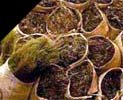 It is becoming a popular replacement for regular teas and for green tea for many consumers because it is caffeine-free, and lower in tannins, yet has a similar and improved profile of health benefits.
It is becoming a popular replacement for regular teas and for green tea for many consumers because it is caffeine-free, and lower in tannins, yet has a similar and improved profile of health benefits.
The science behind rooibos is also growing. Studies are demonstrating that rooibos is rich in many of the ingredients that are proving of interest to scientists today.

Natural Antioxidants
Many scientists increasingly feel it is important that antioxidants come from rich mixtures of biologically active compounds in plants, rather than from isolated synthetic antioxidants.
 Rooibos
Rooibos
-
For rooibos specifically scientists have found that it contains significant levels of antioxidants which are a possible explanation for its apparent health-promoting properties.
Rooibos has comparable amounts of the polyphenol antioxidants, such as flavonoids, that are present in green tea. The antioxidant effect of green tea is thought to be mainly due to these phenolic components.
 View Top Selling Green Tea Products Here.
View Top Selling Green Tea Products Here.

Rooibos & Other Teas
Studies comparing rooibos with other teas found rooibos to have similar levels of the known antioxidants associated with green tea, for example. However, rooibos appears to contain additional active antioxidant components, which are not present in green and other teas, and may be more effective.
 Preparation
Preparation
-
The methods of preparation of rooibos can be enhanced to increase its positive benefits, and the water-soluble component of rooibos also appears important therapeutically.
Botanically, rooibos contains other plant chemicals which account for its short-term effects in calming the nervous system, the gastrointestinal system, and other widely-reported effects.
As rooibos has no caffeine, unlike green tea and other teas, higher consumption of rooibos can be comfortably taken without unwanted side effects. Further, rooibos is more appropriate for children and others who should limit caffeine intake.

Safe & Effective Benefits
Studies on rooibos are showing that consumption of this tea provides a safe and effective way to get the benefits of many plant chemicals that protect the body against disease.
Another important benefit lies in the use of rooibos as a healthy fluid and electrolyte replacement.
Rooibos Contains Measurable Levels Of:
These constituents are important electrolytes and minerals to accompany fluid replacement. In South Africa, rooibos has become popular with athletes as a healthy and natural fluid replacement and is popular as a healthy, natural sports beverage.
References:
- Micozzi, MS, Complementary & Alternative Therapies in..., New York and London: Churchill Livingstone, 2002, in press.
- Marnewick, JL et al, An investigation of the antimutagenic properties of South African herbal teas, Mutation Research 471 (2000) 157-166.
Copyright Sunn Group


